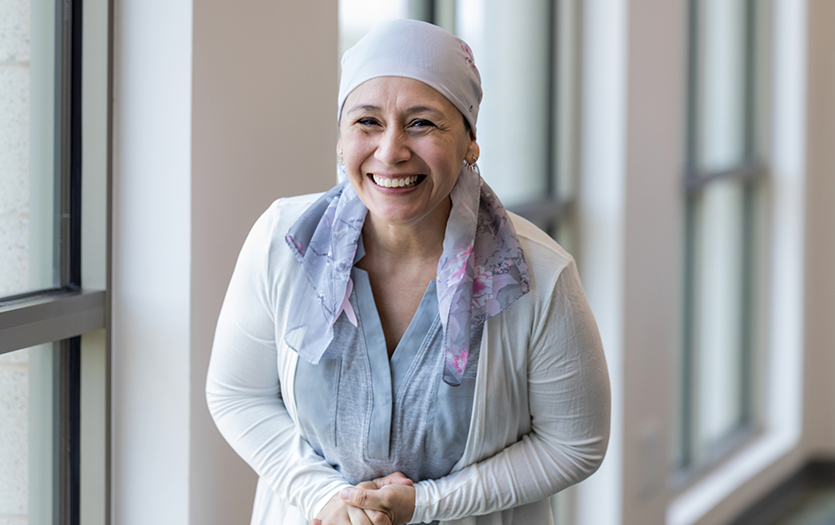
This post was written by Abby Hegerfeld, PT, DPT, Board Certified Specialist in Oncologic Physical Therapy, Certified Lymphedema Therapist (CLT), Credentialed Clinical Instructor (CCI), Parkview Packnett Family Cancer Institute.
Oncology Rehabilitation is a specialized type of physical therapy for patients who have a past, present, or need for future surveillance of their cancer and associated side effects.
How can Oncology Rehab therapy alleviate the side effects of cancer treatment?
Regular exercise guided by a physical therapist with advanced training in the associated side effects of surgical, chemotherapy, immunotherapy and radiation treatments can help to enhance the cancer survivor’s overall health, quality of life and return to functional independence.
The effects of cancer treatment, and some cancers themselves, can lead to significant disabilities and difficulties performing your normal daily activities. Oncology rehabilitation can help with many of the challenges that come along with cancer, including pain, weakness, fatigue or just generally feeling bad.
Physical therapists can offer treatments that:
- Help you perform daily activities (and feel better doing them).
- Improve your strength and endurance.
- Improve your balance.
Our Oncology Rehabilitation team also works closely with a speech therapist who has advanced training with complex swallowing dysfunctions to help patients with head and neck and upper GI malignancies regain swallowing, speech and mobility of their temporomandibular joint.
What conditions benefit from Oncology Rehab?
The Oncology Rehab team offers programs for the following:
- Pre and Post Breast Cancer Rehab
- Strength After Breast Cancer Program
- Oncology Related Lymphedema
- Arm, Breast, Head and Neck, Genital, Leg and Abdominal Lymphedema cancers
- Post Sarcoma Cancer Rehab
- Radiation Fibrosis and Loss of Motion
- Chemotherapy Induced Peripheral Neuropathy
- Cancer Related Fatigue
- Cancer Related Pain
- Cancer Related Bone Loss and Muscle Wasting
- Cancer Related Balance Impairments and Falls
- Pelvic Floor Therapy for Prostate and Gynecological Malignancies
- Pelvic Floor Therapy Related Bowel and Bladder Incontinence
- Sexual Dysfunction
- Restricted Mobility of Ribs Affecting Breathing, Pain and Motion
- Swallowing, Airway, Voice and Speech Impairments Relating to Cancer
What are some of the treatments provided?
Oncology Rehabilitation encompasses the following modalities:
- Guided exercise prescription for strengthening and mobility
- Lymphedema education, treatment, and surveillance
- Bioimpedance SOZO for early-stage lymphedema surveillance
- Prescription of compression garments and bandaging as appropriate
- Dry needling for Chemotherapy Induced Peripheral Neuropathy
- Sensory desensitization after surgeries or with chemotherapy-induced peripheral neuropathy through the use of spikey ball, vibration, TENS and contrast bath
- Low-level cold laser for Axillary Web Syndrome, scarring, and fibrosis within lymphedema patients
- Myofascial release with the use of manual interventions and cupping
- Technology-guided endurance training
- Pelvic Physical Therapy
- Speech Therapy:
- Diagnostic assessment of oropharyngeal and pharyngoesophageal phases of swallowing, including Modified Barium Swallow Study (MBSS)
- Speech, voice and dysphagia serves related to head and neck surgeries/intervention
- Dysphagia and trismus intervention
- Diagnosis and multidisciplinary management of cricopharyngeal dysfunction and Zenker’s diverticulum
How does Oncology Rehab differ from regular physical therapy?
Oncology Rehabilitation is a specialized type of Physical Therapy working with patients who have had a past, present, or need of future surveillance of their cancer and associated side effects. Regular exercise guided by a Physical Therapist with advanced training in the associated side effects of surgical, chemotherapy, immunotherapy, and radiation treatments can help to enhance the cancer survivor’s overall health, quality of life, and return to functional independence.
What can I expect from my first visit?
A comprehensive evaluation is performed looking at your functional limitations as well as a battery of tests and measures that help identify ways we can maximize your function. An individualized plan of care is established to address any current or anticipated impairments. This allows us to be more proactive in your treatment to enhance your quality of life in an otherwise very stressful and difficult period of time.



